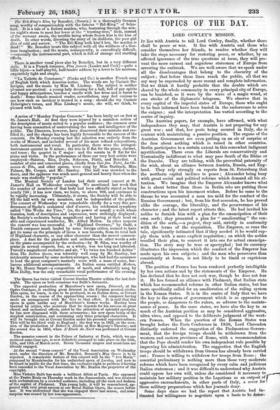A aeries of "Monday Popular Concerts" has been lately set
on foot at St. James's Hall. At first they were injured by a mistaken notion of the description of music suited to a popular audience ; the common error having been committed of undervaluing the taste and intelligence of the public. The Directors, however, have discovered their mistake and rec- tified it; and the change has been highly favourable to the success of the concerts. On Monday evening last the selection was entirely from the works of Mozart, and included several of his most refined compositions, both instrumental and vocal. In particular, there were the stringed- instrument quintet in 0 minor ; the trio in E flat for the piano, clarinet, and tenor ; the quartet in C major : and the sonata in B flat for the piano and violin. In the performance of these our very hest artists were employed—Sainte; Ries, Doyle, Schreurs, Piatti, and Benedict. A number of airs and concerted pieces, chiefly from Cosi fan Tutti, La Ck- stanza di Tito, and other operas, were sung by Miss Stabbaeh, Miss Palmer, Mr. Cooper, and Mr.. Bentley. The hall was crowded to the doors, and the applause was much more general and hearty than when the music was studiedly "popular." The Musical Society of London had their second concert at St. James's Hall on Wednesday evening. We mentioned last week that the number of members of that body had been officially stated as being nearly 750; it has now risen, we learn, to above 900, and continues to be rapidly increasing. Ultimately, it seems, the Society will be able to fill the hall with its own members, and be independent of the public. The concert of Wednesday was remarkable chiefly for a very fine per- formance of Spohr's orehestral chef d'ceuvre, his celebrated symphony called "Die Weihe der Tone," (or, the power of sound) a work whose beauties, both of description and expression, were strikingly displayed ; the Society's orchestra being magnificent and having at their head an able and experienced conductor, Mr. Alfred Mellon. In other respects the concert was less successful. A "Highland Overture," by Gade, a Danish composer much lauded by some foreign critics, seemed to have got its name on the principle of lucus a non lucendo, from its total hick of Highland character, or any other character than the merest common- place. A duet for the pianoforte and orchestra—in other words a solo on the piano accompanied by the orchestra—by M. Silas, was worthy of praise in several respects, but, as a whol Je was too long and laboured. Purcell's magnificent recitative and air, "Ye twice ten hundred deities" from The Indian Queen, was tolerably well sung by Mr. Bentley, but intolerably misused by some modern arranger, who had had the assurance to load the great composer's masterly score with a mass of noisy, bar- barous additional accompaniments. An Italian scene entitled Meckra, by Mr. Henry Smart—a composition of merit, and admirably sung by Miss Dolby, was the only remarkable vocal performance of the evening.


































 Previous page
Previous page